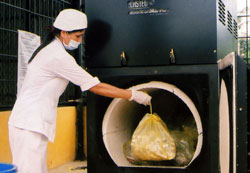
With treatment of medical waste being highly capital-intensive, only around 70 per cent of it is treated in hospitals around the country.
 |
| A worker burns medical waste at a hospital. The shortage of funds has badly affected hospital waste treatment in the country. |
With treatment of medical waste being highly capital-intensive, only around 70 per cent of it is treated in hospitals around the country.
The health sector's need to treat its waste between 2009 an 2015 is nearly VND5 trillion (US$238 million), but most hospitals in the country, especially major ones, are State-run and cannot afford investment on this scale for waste treatment.
This poses a serious threat of diseases spreading.
Consider the numbers: There are more than 1,180 hospitals with 187,840 beds discharging around 380 tonnes of solid waste, including 40 tonnes of hazardous waste, and 150,000cu.m of wastewater every single day.
According to Nguyen Huy Nga, head of the ministry's Department of Health Environment Management, the 200 incinerators in the country, of which the advanced ones are mostly in central hospitals, dispose of only 70 per cent of medical waste.
In fact, only 50 per cent of the hospitals classify their medical wastes.
The volumes are expected to double by 2020 to 800 tonnes of solid waste and 300,000cu.m of wastewater.
Nga has said waste treatment is quite expensive at around VND80,000 ($3.8) per kilogramme while on the other hand not many hospitals individually generate enough waste to justify setting up an incinerator.
In Dong Nai, for instance, the shortage of funds has badly affected medical-waste treatment. The southern province's hospitals and medical centres discharge around 7.7 tonnes of waste a day, including two tonnes of hazardous waste, but their collection is sloppy and wastewater treatment falls short of requirement.
Khanh Hoa has just one treatment centre to dispose of medical waste generated by 21 hospitals all over the central province. Recently it shut down for a week after running out of money to buy materials.
In an effort to combat the problem, the Ministry of Natural Resources and Environment decided earlier this year to earmark 1 per cent of its environmental protection budget to help the Ministry of Health upgrade waste-treatment systems in all public hospitals.
To improve medical-waste treatment, many legal and other documents have been issued recently, including a master plan for treatment in the 2011-15 period that has been approved by the Government.
Since it is a pressing issue, the Ministry of Health has asked for an increase in investment in many approved healthcare projects for setting up wastewater treatment facilities.
The ministry is also using a $155 million loan from the World Bank for a six-year project to build and upgrade wastewater treatment systems at five major public hospitals and a number of other leading ones in the Cuu Long (Mekong) Delta.
(Source: VNS)




